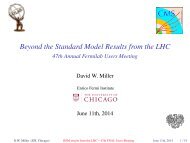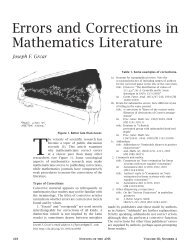PW_mar13_sample_issue
PW_mar13_sample_issue
PW_mar13_sample_issue
Create successful ePaper yourself
Turn your PDF publications into a flip-book with our unique Google optimized e-Paper software.
Lateral Thoughts: Gordon Fraser<br />
The incomprehensibility principle<br />
Educators and psychologists invented the term “attention<br />
span” to describe the length of time anyone can<br />
concentrate on a particular task before becoming distracted.<br />
It is a useful term but span, or duration, is<br />
only one aspect of attention. Attention must also have<br />
an intensity – and the two variables are independent<br />
of each other. Perhaps one can postulate an analogue<br />
of the Heisenberg uncertainty principle, in which the<br />
intensity of attention multiplied by its span cannot<br />
exceed some fixed value. I call this the “incomprehensibility<br />
principle” and I have had plenty of opportunities<br />
to observe its consequences.<br />
In the hands of skilled presenters, information can<br />
be carefully packaged as entertainment so that the<br />
attention needed to digest it is minimal. The trick is to<br />
mask the effort with compelling emotional appeal and<br />
a floppy boy-band haircut. However, the need to pay<br />
attention is still there; in fact, absorbing even the most<br />
trivial information demands a modicum of attention.<br />
How many of us, when leaving a cinema, have had the<br />
nagging feeling that although the film made for great<br />
entertainment, some details of the plot remained less<br />
than crystal clear?<br />
The existence of a minimum level of attention suggests<br />
that it is, in some sense, a quantum substance. This<br />
means that under close examination, any apparently<br />
continuous or sustained effort at paying attention will be<br />
revealed as a series of discrete micro-efforts. However,<br />
while attention can be chopped up and interleaved with<br />
other activities, even tiny pulses of attention demand<br />
full concentration, to the exclusion of all other voluntary<br />
activities. Any attempt at multitasking, such as using a<br />
mobile phone while driving a car, is counterproductive.<br />
The incomprehensibility principle plays a major role in<br />
education, where it is closely linked to the learning process.<br />
Because of the subject matter and/or the teacher,<br />
some school lessons require more time to assimilate<br />
than others. This trend accelerates in higher education.<br />
In my case, a hint of what was to come appeared during<br />
my third year of undergraduate physics, when I attended<br />
additional lectures on quantum mechanics in the mathematics<br />
department at Imperial College London.<br />
My teacher was Abdus Salam, who went on to share<br />
the Nobel Prize for Physics in 1979. Salam’s lectures<br />
were exquisitely incomprehensible; as I look back, I<br />
realize he was probably echoing his own experiences at<br />
Cambridge some 15 years earlier at the hands of Paul<br />
Dirac. He referred us to Dirac’s book The Principles<br />
of Quantum Mechanics. At a first and even a second<br />
glance this book shone no light at all, but after intense<br />
study, a rewarding glimmer of illumination appeared<br />
out of the darkness.<br />
Motivated by Salam’s unintelligibility, I began postgraduate<br />
studies in physics only to find that my previous<br />
exposure to incomprehensibility had been merely an<br />
introduction. By then, there were no longer any textbooks<br />
to fall back on and journal papers were impressively baffling.<br />
With time, though, I realized that – like Dirac’s<br />
book – they could be painfully decrypted at “leisure”,<br />
line by line, with help from enlightened colleagues.<br />
The real problem with the incomprehensibility principle<br />
came when I had to absorb information in real<br />
84<br />
The existence<br />
of a minimum<br />
level of<br />
attention<br />
suggests<br />
that it is, in<br />
some sense,<br />
a quantum<br />
substance<br />
physicsworld.com<br />
time, during seminars and talks. The most impenetrable<br />
of these talks always came from American speakers<br />
because they were, at the time, wielding the heavy cutting<br />
tools at the face of physics research. Consequently,<br />
I developed an association between incomprehensibility<br />
and accent. This reached a climax when I visited<br />
the US, where I always had the feeling that dubious<br />
characters hanging out at bus stations and rest stops<br />
must somehow be experts in S-matrix theory and the<br />
like, travelling from one seminar to the next. Several<br />
years later, when I was at CERN, seminars were instead<br />
delivered in thick European accents and concepts such<br />
as “muon punch-through” became more of an obstacle<br />
when pointed out in a heavy German accent.<br />
Nevertheless, I persevered and slowly developed new<br />
skills. The incomprehensibility principle cannot be<br />
bypassed but even taking into account added difficulties<br />
such as the speaker’s accent or speed of delivery – not to<br />
mention bad acoustics or poor visual “aids” – it is still<br />
possible to optimize one’s absorption of information.<br />
One way of doing this is to monitor difficult presentations<br />
in “background mode”, paying just enough attention<br />
to follow the gist of the argument until a key point<br />
is about to be reached. At that moment, a concerted<br />
effort can be made to grab a vital piece of information<br />
as it whistles past, before it disappears into the obscurity<br />
of the intellectual stratosphere. The trick is to do<br />
this at just the right time, so that each concentrated<br />
effort is not fruitless. “Only cross your bridges when<br />
you come to them,” as the old adage goes.<br />
By adopting this technique, I was able to cover frontier<br />
meetings on subjects of which I was supremely<br />
ignorant, including microprocessors, cosmology and<br />
medical imaging, among others. Journalists who find<br />
themselves baffled at scientific press conferences would<br />
do well to follow my example, for the truth is that there<br />
will always be a fresh supply of incomprehensibility in<br />
physics. Don’t be disappointed!<br />
Gordon Fraser, a former editor of CERN Courier magazine, died in<br />
January before this article could be revised. It was completed by staff<br />
at Physics World and is published both here and in CERN Courier this<br />
month as a tribute.<br />
Physics World March 2013<br />
iStockphoto/Francisco Romero








